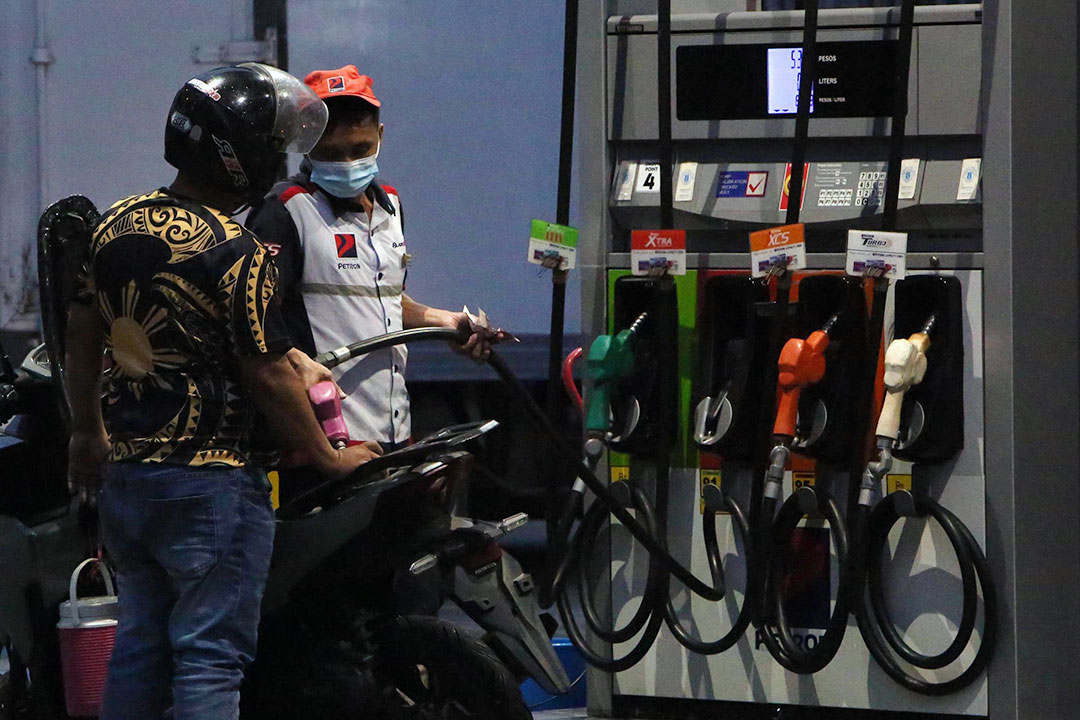Oil price shocks could fuel inflation anew

FURTHER VOLATILITY in oil prices and potential price adjustments could threaten the inflation downtrend and derail the Bangko Sentral ng Pilipinas’ (BSP) easing cycle, analysts said.
“If the latest fuel price volatility continues to depend on what is happening in Gaza and the rest of the Middle East, we might be looking at some potentially disruptive oil price adjustments,” GlobalSource Research Country Analyst Diwa C. Guinigundo said in a Viber message.
Oil prices shot up after Iran launched a missile attack on Israel in early October. Prices have since slid after Israel signaled it was not planning to attack Iranian nuclear or oil targets.
Pump prices on Tuesday jumped for a fourth straight week for gasoline, and a third straight week for diesel and kerosene as global crude oil prices continued to rise amid heightened tensions in the Middle East. Fuel retailers raised gasoline prices by P2.65 per liter, diesel by P2.70 per liter and kerosene by P2.60 per liter.
“I believe the BSP’s (inflation) forecasts are anchored on a global fuel price of at least $100 per barrel of oil,” Mr. Guinigundo, a former BSP deputy governor, said.
“If this critical level is tipped, and tipped long, there is a likelihood higher global oil prices could affect the supply side, dislodge inflation expectations and risk breaching the inflation target for the next four months,” he added.
The central bank sees inflation averaging 3.4% this year and 3.1% in 2025.
Mr. Guinigundo said the oil price spikes would not necessarily stoke inflation but warned that prolonged or larger adjustments could be inflationary.
“It’s one of those regular adjustments of fuel prices to reflect global prices, among others. If not sustained over a longer period, and at significant measure, higher fuel price adjustments will not significantly affect inflation and its path.”
The latest Development Budget Coordination Committee (DBCC) assumptions show that Dubai crude oil will likely range from $70 to $85 per barrel this year.
The BSP in its latest Monetary Policy Report predicted a scenario where inflation could breach the 2-4% target if Dubai crude prices breach $90 per barrel in 2025 and above $100 per barrel in 2026.
Leonardo A. Lanzona, Jr., an economics professor at the Ateneo de Manila University, also flagged a possible inflation spike with the hefty oil price adjustment.
“The oil price hike will certainly impact inflation. The surprising decrease in inflation in the last few weeks has nothing to do with any reforms the government purportedly implemented,” he said in an e-mail.
Mr. Lanzona said the country might be “vulnerable to the inflation resurgence and greater geopolitical tensions expected in the coming weeks.”
Headline inflation slowed to 1.9% in September from 3.3% in August. This was the slowest since 1.6% in May 2020.
This brought nine-month inflation to 3.4%, matching the central bank’s full-year forecast.
BSP Governor Eli M. Remolona, Jr. earlier said inflation remains on a “target-consistent path.”
Mr. Guinigundo said the central bank might need to be cautious about aggressively reducing rates.
“This, plus the possible weakening of the peso on account of general monetary easing in the region, could make monetary authorities think twice before easing by an amount greater than 25 basis points (bps),” he said.
The Monetary Board is set to meet on Oct. 16 for its policy review.
A BusinessWorld poll conducted last week showed that 16 of 19 analysts expect the Monetary Board to reduce rates by 25 bps, which would bring the target reverse repurchase rate to 6% from 6.25%.
“Again, the future decision of the BSP will remain data-dependent—what the actual inflation is telling us, and the prognosis in the next two years,” he added.
Mr. Remolona earlier said the central bank would likely opt for 25-bp rate cuts over 50 bps. — Luisa Maria Jacinta C. Jocson



